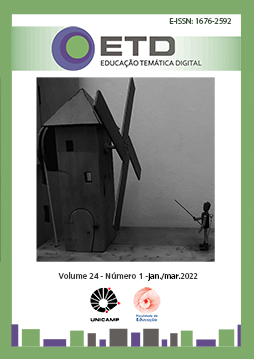Abstract
In this article, it investigates how training and teaching work are treated in UNESCO's proposals on mobile technology and learning. Some documents published during the Covid-19 pandemic are discussed, but the focus of the analysis is on documents prepared in 2012 and 2014. The research draws theoretically on Michel Foucault's notion of governmentality and Stephen Ball's discussions related to this notion in the context of contemporary neoliberalism. Analytically, it describes how UNESCO proposes mobile technology and mobile learning as important tools to transform education, advocating their use in teacher training and work, especially in poor and developing countries. Next, we discuss who finances the documents analyzed, what are the possible interests of the financiers and the market issues to which such financing may be related. It concludes by pointing out the proposals described as part of conduct control mechanisms in favor and being part of contemporary mentalities based on market neoliberalism.
References
BALL, S. J. Diretrizes políticas globais e relações políticas locais em Educação. Currículo sem Fronteiras, v. 1, n. 2, p. 99-116, jul./dez. 2001. Disponível em: https://www.curriculosemfronteiras.org/vol1iss2articles/ball.pdf. Acesso em: 21 nov. 2020.
BALL, S. J. Educação Global S. A.: novas redes de políticas e o imaginário neoliberal. Ponta Grossa: UEPG, 2014.
BANCO MUNDIAL. Estrategia sectorial de educación. Washington, D.C.: Grupo del Banco Mundial, 2000. Disponível em: https://documents1.worldbank.org/curated/en/469761468150873366/pdf/196310SPANISH0BOX0338884B.pdf. Acesso em: 06 ago. 2021.
BARDIN, L. Análise de Conteúdo. São Paulo: Edições 70, 2011.
CARVALHO, C. R. As tecnologias móveis na escola e o trabalho docente. 2017. Tese (Doutorado) – Universidade Estadual Paulista, Faculdade de Ciências e Tecnologia, 2017.
CASTIONI, R.; MELO, A. A. S.; NASCIMENTO, P. M. Universidades federais na pandemia da Covid-19. Ensaio, v. 29, n. 111, abr./jun. 2021. DOI: https://doi.org/10.1590/s0104-40362021002903108.
COSTA, S. S G. Governamentalidade neoliberal, Teoria do Capital Humano e Empreendedorismo. Educação e Realidade, v. 34, n. 2, p. 171-186, mai./ago. 2009. Disponível em: https://seer.ufrgs.br/educacaoerealidade/article/view/8299/5537. Acesso em: 06 ago. 2021.
EVANGELISTA, R. M. F. As políticas de tecnologias móveis na educação: técnicas de governamento dos outros e de si. 2017. Dissertação (Mestrado) – Universidade Federal de Ouro Preto, 2017.
FOUCAULT, M. O sujeito e o poder. In: DREYFUS, H. L.; RABINOW, P. (Orgs.). Michel Foucault: Uma trajetória filosófica. Rio de Janeiro: Forense Universitária, 1995.
FOUCAULT, M. O nascimento da biopolítica. São Paulo: Martins Fontes, 2008.
FOUCAULT, M. Segurança, território, população. São Paulo: Martins Fontes. 2008a.
GENTILLI, P. Neoliberalismo e Educação: manual do usuário. In: GENTILLI, P.; SILVA, T. T. (Org.). Escola S.A. Brasília: CNTE, 1994.
HYPÓLITO, A. M. Políticas curriculares, estado e regulação. Educação e Sociedade, v. 31, n. 113, p. 1337-1354, out./dez. 2010. DOI: https://doi.org/10.1590/S0101-73302010000400015.
LIMA, G. P. C; MENDES, C. L. Currículo, avaliação e a constituição do sujeito docente. Práxis Educativa, v. 11, n. 3, set./dez. 2016, p. 714-735. DOI: https://doi.org/10.5212/PraxEduc.v.11i3.0011.
MAINARDES, J. Abordagem do ciclo de políticas públicas: uma contribuição para a análise das políticas educacionais. Educação e Sociedade, Campinas, v. 27, n. 94, p. 47-69, jan./abr. 2006. DOI: https://doi.org/10.1590/S0101-73302006000100003.
MAUÉS O. C.; BASTOS R. S. As políticas de educação superior na esteira dos organismos internacionais. RBPAE, v. 32, n. 3, set./dez. 2016, p. 699-717. DOI: DOI: https://doi.org/10.21573/vol32.
PAPADOPOULOS, G. Education 1960-1990: the OECD perspective. Paris: OECD, 1994. Disponível em: http://hdl.voced.edu.au/10707/44807. Acesso em: 06 ago. 2021.
PEREIRA, D. O. A formação docente no contexto da universidade aberta do Brasil. Dissertação (Mestrado) – Universidade Federal de Ouro Preto, 2017.
REZENDE, M. J. Justiça escolar e justiça diferencialista nos documentos adotados por órgãos das nações unidas (pnud e unesco). Lua Nova, n. 108, 121-135, 2019. DOI: http://dx.doi.org/10.1590/0102-121135/108.
RIBEIRO, G. F. Afinal, o que a organização mundial do comércio tem a ver com a educação superior? Revista Brasileira de Política Internacional, n. 49, v. 2, 2006, p. 137-156. Disponível em: https://www.scielo.br/pdf/rbpi/v49n2/a08v49n2.pdf. Acesso em: 13 nov. 2020.
SEGATA, J. A colonização digital do isolamento. Cadernos de Campo, v. 29, n. 1, p. 163-171, 2020. DOI: https://doi.org/10.11606/issn.2316-9133.v29i1p163-171.
SHAMIR, R. The age of responsibilization: on market-embedded morality. Economy and Society, v. 37, n. 1, p. 1-19, fev. 2008. DOI: 10.1080/03085140701760833.
UNESCO. Mobile Learning for teacher: global themes. Paris: UNESCO, 2012. Disponível em: http://unesdoc.unesco.org/images/0021/002164/216452E.pdf. Acesso em: 16 nov. 2020.
UNESCO. Turning on mobile learning in latin america. Paris: UNESCO, 2012a. Disponível em: http://unesdoc.unesco.org/images/0021/002160/216080E.pdf. Acesso em: 14 nov. 2020.
UNESCO. O futuro da aprendizagem móvel. Brasília: UNESCO, 2014.
UNESCO. Diretrizes de políticas para aprendizagem móvel. Brasília: UNESCO, 2014a.
UNESCO. Tecnologias para a transformação da educação. Brasília: UNESCO, 2014b.
UNESCO. Five steps to support education for all in the time of COVID-19. Paris: UNESCO, 2020. Disponível em: http://www.iiep.unesco.org/en/maintain-operational-capacities-during-school-closures. Acesso em: 16 nov. 2020.
UNESCO. Informe de seguimiento de la educación en el mundo 2020: inclusión y educación: todos e todas sin excepción. Paris: UNESCO, 2020a.
UNESCO. Supporting learning recoveryone year into COVID-19: The Global Education Coalition in action. Paris: UNESCO, 2021. Disponível em: https://unesdoc.unesco.org/ark:/48223/pf0000376061. Acesso em: 20 maio 2021.
UNESCO; UNICEF; BM; WFP. Marco de ação e recomendações para a reabertura de escolas. Abr. 2020. Disponível em: https://www.unicef.org/brazil/media/8761/file/marco-de-acao-e-recomendacoes-para-a-reabertura-de-escolas.pdf. Acesso em: 15 nov. 2020.

This work is licensed under a Creative Commons Attribution-NonCommercial-NoDerivatives 4.0 International License.
Copyright (c) 2022 ETD - Educação Temática Digital


